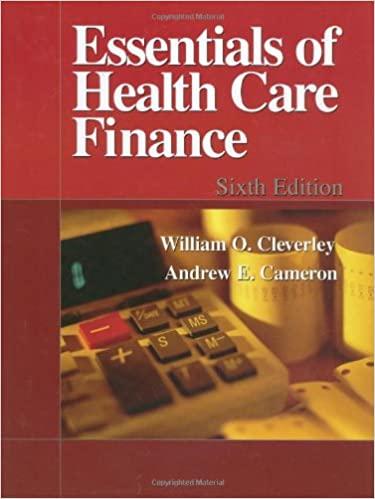Question
Read the two articles posted on Blackboard, in Course Documents Lesson #5, entitled The Clippersare Worth Nowhere Near What Ballmer is Paying and Why The
Read the two articles posted on Blackboard, in Course Documents Lesson #5, entitled The Clippersare Worth Nowhere Near What Ballmer is Paying and Why The Clippers are Worth $2 Billion, and respond to the following questions. Where there is incomplete information, provide reasonable assumptions.
https://time.com/2800607/steve-ballmer-los-angeles-clippers-worth/
https://www.sbnation.com/nba/2014/5/29/5763084/clippers-sale-value-billions-steve-ballmer-donald-sterling
Question
-
We are told the Clippers revenues at the time Steve Ballmer bought them was $128 million, and its profit was $15 million.
-
a) At a purchase price of $2 billion, what is Ballmers ROA?
-
b) To what level would the Clippers revenues need to rise in order for Ballmer to generate a ROA
of 5%? 10%?
-
-
Assume the Clippers fixed costs (including things like Player salaries, administration and facilities costs) are equal to $100 million. Further assume that the Clippers TV and sponsorship revenue is $75 million and its only other source of revenue is ticket sales.
-
a) How many tickets would the Clippers need to sell in order to breakeven, if the average
contribution margin per ticket is $25?
-
b) How many tickets would the Clippers need to sell in order to breakeven, if the average
contribution margin per ticket is $50?
-
c) The Clippers play 41 home games a season in a 20,000 seat arena. What is the likelihood of
breaking even under scenarios a) and b) above?
-
d) Are there any other variables that have not been contemplated above that could impact your
response to c) above?
-
-
Assume instead that Ballmer finances the purchase with 50% debt, and that Ballmers cost of capital (interest cost and equity cost) is 5%. Further assume that 10,000 shares have been issued (of which Ballmer is the majority holder), and that the Clippers pay tax of 40%.
-
a) Create a crude Balance Sheet, showing the Assets, Liabilities, and Equity of the Clippers at the
time of sale.
-
b) What is the Clippers Earnings per Share under this scenario?
-
c) What is the Clippers Degree of Financial Leverage under this scenario?
-
-
Assume that Clippers cash flows are expected to be equal to its operating profit for the foreseeable future. At a discount rate of 5% and an investment life of 20 years:
-
a) What is the present value of these cash flows?
-
b) Was Ballmers purchase price appropriate? If not, what variables could he reasonably effect to
make this a better investment? answer for Question # 1 an 2
Q - 1
Part (a)
ROA = Profits / Total asset = Profits / total consideration = 15 / 2,000 = 0.75%
Part (b)
Profit margin = Profit / revenue = 15 / 128 = 11.72%
For ROA of 5%, desired revenue = ROA x total consideration / Profit margin = 5% x 2,000 / 11.72% = $ 853.33 million
For ROA of 10%, desired revenue = ROA x total consideration / Profit margin = 10% x 2,000 / 11.72% = $ 1,706.67 million
Q - 2
a) Tickets Clippers need to sell in order to breakeven = (Fixed costs - TV and sponsorship revenue) / Average contribution margin per ticket = (100 million - 75 million) / $ 25 = 1 million = 1,000,000
b) Tickets would the Clippers need to sell in order to breakeven= (Fixed costs - TV and sponsorship revenue) / Average contribution margin per ticket = (100 million - 75 million) / $ 50 = 0.5 million = 500,000
c) The Clippers play 41 home games a season in a 20,000 seat arena. What is the likelihood of breaking even under scenarios a) and b) above?
41 games x 20,000 seats = 820,000 seats < 1,000,000
Even if we assume 100% occupancy, Clippers will not break even under scenario (a)
820,000 seats > 500,000
Break even occupancy rate = 500,000 / 820,000 = 60.98% (a reasonable figure)
There appears reasonable likelihood of breaking even under scenarios (b) above
d) Are there any other variables that have not been contemplated above that could impact your response to c) above?
Yes, occupancy rate of the seats have not been considered. It's an important factor and could impact the response to (c) above.
-
Step by Step Solution
There are 3 Steps involved in it
Step: 1

Get Instant Access to Expert-Tailored Solutions
See step-by-step solutions with expert insights and AI powered tools for academic success
Step: 2

Step: 3

Ace Your Homework with AI
Get the answers you need in no time with our AI-driven, step-by-step assistance
Get Started


